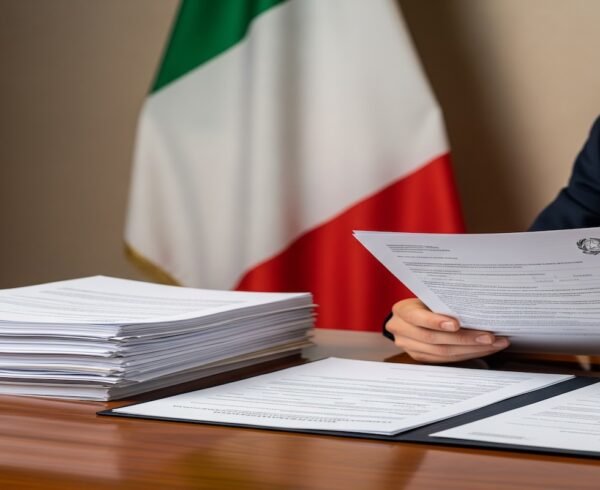The issue of the residence permit for family reunification is part of a complex regulatory and legal context, which aims at balancing the needs of immigration control with the protection of the fundamental rights of the person, in particular of the child.
The Court of Cassation has clarified the limits of the expulsion of parents in clandestine status in order to protect the right of the minor child to grow up.
In a judgment delivered by the United Sections, the Court of Cassation clarified how in certain circumstances the expulsion of a non-EU parent in an irregular situation may be considered contrary to the best interests of the child, recognising the family member’s right to remain in Italy. The consequence is that the rules on expulsion may be changed by recent case-law, which has enhanced the right to family reunification when minors are involved.
The rules on the expulsion of foreigners
The Consolidation Act on Immigration (Decree 286/1998) provides for several grounds for expulsion of non-EU citizens. These include:
- Illegal entry or stay: entry into Italian territory without a visa or residence permit.
- Lack of a valid residence permit: staying in Italy without a permit or with a permit that has expired and not been renewed within the time limit.
- Serious criminal convictions: for offences such as terrorism, drug trafficking or exploitation of prostitution.
- Danger to public order or state security: a person can be expelled if considered a threat to national security, even without a criminal conviction.
Expulsion, as an instrument of migration policy, is designed to ensure public order and compliance with immigration regulations. However, when family concerns are involved and, in particular, the presence of minors, the situation is complicated, and the law provides specific exemptions for family reunification.
Residence permit for family reunification: rules and exceptions
The residence permit for family reunification allows a non-EU citizen to obtain authorisation to reside in Italy to reunite with family members who are already legally resident in the territory or Italian citizens. The legislation is aimed at protecting family unity, but the procedures to obtain it are strict, demanding requirements such as minimum income, availability of suitable accommodation and compliance with general immigration regulations. These requirements are also necessary when a residence permit is requested for cohabitation of an Italian citizen with a non-EU citizen.
Italian law also recognises the possibility of derogating from immigration rules in particular cases, including the protection of minors. In fact, Article 31, paragraph 3 of Legislative Decree 286/1998 provides that a family member of a minor may obtain a residence permit, as an exception to the ordinary rules, if there are serious reasons related to the minor’s psycho-physical development. This instrument is mainly used to allow parents or other family members to remain in Italy when their expulsion could cause irreparable harm to the child.
Protection of the Child’s Best Interest
A fundamental principle guiding Italian immigration case law is that of the best interests of the child, enshrined in the United Nations Convention on the Rights of the Child and transposed into Italian law. This principle requires that, in any decision concerning a child, the child’s best interests must be the primary consideration. This has led jurisprudence to recognise the child’s right to maintain a stable bond with his or her parents, even in situations of irregular stay.
The Court of Cassation, in a recent judgment of the United Sections, reaffirmed that the expulsion of an illegal parent can be suspended if such a measure compromises the child’s psycho-physical development. In this context, the residence permit for family reunification can be issued as a temporary measure, as long as the emergency reasons related to the child remain.
The Judicial Case: The Supreme Court’s Decision
The case examined by the United Sections of the Court of Cassation involved a Moroccan citizen, H.R., the father of a child born in Italy to a mother who was also Moroccan but legally resident in Italy. H.R. was irregular, and had received a deportation order from the Italian territory. He, as the father, had appealed against the expulsion, arguing that the separation from his daughter would have caused serious trauma to the child, compromising her psychophysical development.
The Juvenile Court had upheld the appeal, authorising the father to remain in Italy for three years. However, the decision was subsequently challenged by the Public Prosecutor at the Ancona Juvenile Court, who argued that an authorisation to remain in Italy for reasons related to the child’s best interests was inadmissible unless expressly provided for by the immigration law.
The United Sections of the Court of Cassation, called upon to resolve the conflict of jurisprudence, ruled that the principle of the best interests of the child may justify an exception to the rules on deportation. In particular, the Court emphasised that, in cases of proven need linked to the protection of the child, it is possible to suspend expulsion and grant a residence permit for family reunification.
Implications of the Judgment for Immigration Law
The decision of the United Sections of the Supreme Court is significant not only for the individual case, but also for future jurisprudence on immigration and family rights. It reaffirms the centrality of the principle of the best interests of the child and places strict limits on the deportation of parents of minors present on Italian territory.
This judgment could set an important precedent for other families in similar circumstances, expanding the possibilities of obtaining a residence permit for family reunification even in situations of irregularity. However, it remains essential that there are serious reasons related to the child’s welfare, ascertained by a competent judicial authority, which must recognise the need and priority of the child’s protection, even at the cost of derogating from the rules regulating the stay of foreigners in Italy.














